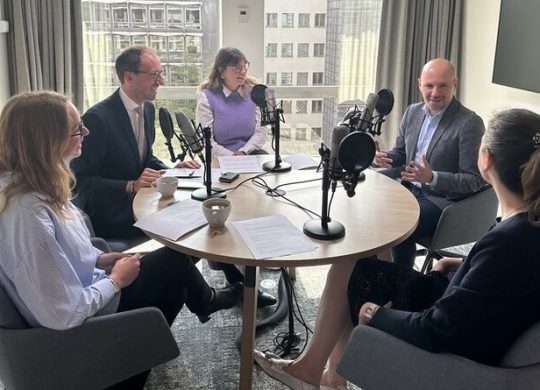Global Public Affairs Newswire – 31 May 2024
Welcome to the latest instalment of FTI Consulting’s fortnightly Global Public Affairs Newswire.
In this bumper edition, we unpack this week’s historic election in South Africa, arguably the most contested national vote in the country since their first democratic election in 1994. We also turn our attention to the United States, where former President Trump has been found guilty of falsifying business records. Meanwhile, we assess the latest state of play in the UK after Prime Minister Rishi Sunak finally set 4 July as the date for Britain’s own General Election, firing the starting gun on the national campaign. Beyond this, we take a look at the latest statistics from the EU, as the bloc prepares for the imminent European Parliamentary elections.
We also bring you our usual comprehensive market update, which offers analysis on the latest trending developments from across the world’s major markets. This week, we explore the divisions in India over the proposed Digital Competition Bill, whilst examining China’s own efforts to boost its semiconductor industry. All of this, while we have been keeping a close eye on the movements of French President Emmanuel Macron, who this week has attended a state visit in Germany, shortly after returning from a 20,000+ miles round-trip to address the mounting tensions in New Caledonia.

Our global team are closely tracking the key votes and contests in this worldwide ‘Year of the Election’. In each edition of the Newswire, we look to dive into the upcoming implications, considerations, and opportunities for business.

On 29 May, South Africans turned out in large numbers to vote in the country’s most contested general election since the first democratic election in 1994. Investors are anxious as polls indicate that the ruling African National Congress (ANC) might fall below the 50% threshold, potentially forcing the ANC into a coalition for the first time in a national election.
For the first time in the country’s history, independent candidates with no party affiliation are on the ballot. Seats in Parliament are allocated based on each party’s share of the vote. Counting began immediately after the polls closed late Wednesday, with final results expected by Sunday, 2 June, according to the independent electoral commission overseeing the election.
The election’s outcome hinges on whether the ANC can secure a majority or must form a coalition. Three scenarios are possible: an outright majority, a stable coalition with smaller parties, or a precarious coalition with major opposition parties like the Democratic Alliance (DA) or Economic Freedom Fighters (EFF). Precarious coalitions have previously destabilized local governments in South African municipalities. Additionally, provincial administrations are at stake, with closely contested races expected in Gauteng, the country’s economic hub, KwaZulu-Natal, and possibly the Western Cape.
Depending on the outcome of the national election, there could be significant changes in the country’s policy direction. Policy continuity is expected with an outright majority or a stable coalition. However, a significant departure from the current trajectory is likely if the government includes the DA or EFF. A DA partnership may lead to a more business-friendly approach, while an EFF partnership could result in a more radical, populist tilt. An unstable coalition carries the potential to deter investment, fail to kickstart much-needed economic growth, further hinder efforts to address poverty and inequality, and weaken public trust in the government’s ability to deliver essential services.
Adding to the uncertainty, the ANC has not indicated who it might work with if South Africa needs an unprecedented national coalition government. The new Parliament is required to convene for its first session within 14 days of the election results being announced to select the President. If the ANC loses its majority, a hectic period of negotiations with other parties to form a coalition is expected before Parliament assembles.

On Thursday, a New York jury found President Trump guilty of falsifying business records. The verdict does not legally impact his eligibility as a national candidate in 2024. Political observers question whether the conviction will have any impact on voters’ perceptions of President Trump, or their preference of candidate in this Fall election.
Biden’s fundraising advantage slips: While the Biden team has led in national fundraising (one indicator of voter enthusiasm) over the course of the campaign, Biden fell nearly $20mm short of the $76mm Trump and the GOP raised in April. Biden still holds a sizable cash-on-hand advantage heading into the summer, but Biden’s polling numbers and the high stakes of the election have generated a “freakout” amongst Biden’s donors, diminishing enthusiasm, according to a report in Politico.
Who needs a convention when we can phone it in? In many states, there are provisions in the law requiring ballots to be prepared for the fall elections months prior to Election Day. With national conventions occurring slightly later than usual this year, some states, like Alabama and Washington State, have modified their provisions to ensure Biden/Harris can be on the ballot after they officially are nominated at the national convention in mid-August. In conservative Ohio, the legislature was unable to make accommodations, threating President Biden’s ability to appear on the Ohio ballot. This week, DNC Chairman Jamie Harrison announced that the DNC will hold a “phone-in roll call” to meet Ohio’s requirements, to assure that Biden will be the official nominee, and to ensure Biden Harris will appear on the Ohio ballot. More details how this unprecedented roll call are forthcoming, according to Chairman Harrison.
Trump responds to college protests: Leaders in higher education continue to be grapple with managing college unrest after months of protests and encampments on campuses. Meeting with donors in New York, President Trump suggested he would expel foreigners protesting on U.S. college campuses by expelling them from the country. Calling the pro-Gaza protestors part of a “radical revolution”, he vowed to “set that movement back 25 or 30 years” when he is elected in November.
“My wife is fond of flying flags. I am not.” Supreme Court Justice Alito responded to a Congressional inquiry suggested he recuse himself from all hearings related to potential crimes committed during the assault on the US Capitol on January 6, 2021 noting that two flags associated with the far-right MAGA movement were reportedly flown on his properties. In his letter, Justice Alito reaffirmed his impartiality, and said that his wife either co-owns or owns the properties where these flags were flown, and as a private citizen, has every right to do so, with or without his consent.

UK Prime Minister, Rishi Sunak has called a snap General Election for 4 July 2024. Speaking from outside his official residence at 10 Downing Street last week, Sunak framed the election as a choice between “bold action” to build on ‘progress’ under the Conservative Party and an ‘uncertain’ future with the Labour Party, which he claimed lacks a clear plan.
Labour Leader, Keir Starmer welcomed Sunak’s announcement, asserting that “it’s time for change” and argued that “Britain deserves better” than another five years of Conservative Government.
In a bid to win over undecided voters, the Conservatives have set out their plan to deliver on five priorities: halving inflation, growing the economy, reducing debt, cutting National Health Service (NHS) waiting lists and stopping illegal migration to Britain by small boats crossing the English Channel. The Conservatives have also pledged to replace the “A-level” exams sat by English pupils in their final year of school with a new ‘Advanced British Standard”; enhance the current “triple lock” pension system under “triple lock plus” plans; and introduce compulsory national service for 18-year-olds, with either a 12-month military placement or compulsory volunteering for 25 days a year in civil resilience roles.
On the other side of the political aisle, the Labour Party has set out its first six steps for change: delivering economic stability; cutting NHS waiting times; launching a new border security command; setting up a publicly owned “Great British Energy” utility company; cracking down on antisocial behavior; and recruiting 6,500 new schoolteachers. Labour have also said that they could give 16 and 17-year-olds the right to vote and would renationalize most passenger rail services within five years.
At the time of writing, the polls point to a likely Labour victory, by a considerable margin and with a large majority in the House of Commons. However, with five weeks left to go until polling day, there is still time for the polls to move considerably, in either direction.
The Conservatives will be hoping that there is indeed still plenty of time in the campaign for their fortunes to improve, but the clock is ticking – it is now or never for the Prime Minister. If Rishi Sunak is going to deliver on his promises to his MPs and turn things around for his party, he needs to do it now.

Ahead of the EU elections, all Member States published their candidate lists, with 62% of current MEPs expected to run again.
The latest seat projections show slight shifts: the EPP (traditional right) is expected to gain 184 seats, the S&D (traditional left) 128, Renew Europe (centrist) 92, ECR (right) 87, ID (far right) 88, Greens 50, and The Left 48, with 43 non-affiliated seats. Coalition scenarios include a Grand Coalition (EPP, S&D, Renew) with 404 seats, and a potential right coalition (Renew, EPP, ECR) narrowly reaching a majority with 363 seats, but facing cooperation challenges.
The European Commission is expected to see a 75% turnover, with only three Commissioners likely to remain in place. The EPP is projected to strengthen its position despite some losses, gaining influence from new members from several countries.
Finally, in the Council, political affiliations are set to change by June 2024. The EPP will have twelve seats, gaining two more than in 2019. S&D will have four seats, a decrease of three. Renew Europe might hold up to five seats, though two are uncertain due to political developments in Belgium and the Netherlands. The ECR group is growing and could match Renew Europe if certain parties join. However, national interests and other alliances will also influence the final choice of top candidates.

As Irish voters prepare to go to the polls for local and European Parliament elections on 7 June, voters in Limerick are also gearing up to vote in Ireland’s first ever directly elected mayoral contest.
A 2019 plebiscite saw the people of Limerick vote in favor of a proposal for a directly elected mayor. The successful candidate will be Ireland’s first mayor with executive powers set out in legislation. 15 candidates are running for the position, including two sitting members of parliament. If either are elected, it would trigger a by-election for their parliament seat, which must be held within six months of the seat being vacated. Another high-profile candidate is the former Secretary General at Ireland’s Department of Finance and former board member of the European Investment Bank, John Moran, who is running as an Independent.
Meanwhile, over 2,000 candidates are running for 949 seats across Ireland’s 31 local councils. Independent candidates are currently leading in the polls for local elections at 23%, followed by government coalition parties Fine Gael (21%) and Fianna Fail (20%).
Up until recently, opposition party Sinn Féin had been leading in the polls, but are now down to 18%. As immigration has grown as a concern for Irish voters, the party has lost support to Independents who are more outspoken on the subject. Meanwhile, Fine Gael’s newly appointed leader, Taoiseach (Prime Minister) Simon Harris, has been leading the government’s response to address concerns and the increasing number of people entering the country seeking asylum.
Market updates

India’s tech ecosystem is divided over the proposed Digital Competition Bill, which introduces ex-ante regulations against the current ex-post approach. Released for consultation in March, the draft draws inspiration from the EU’s untested Digital Markets Act. It targets big firms with a global turnover of USD$30 billion and at least 10 million users in India, but also proposes qualitative parameters that may also hit startups. This Bill is part of New Delhi’s efforts to address the increasing market power of Big Tech.
The US-India Business Council (USIBC) has asked the Ministry of Corporate Affairs to rethink the EU-like competition law, arguing that stricter regulations and compliance costs could be passed down to consumers and partner businesses in the form of higher prices for digital services.
Other stakeholders, including global firms, large domestic players, and internet activists, requested a five-month extension to the consultation deadline of May 15, given the complexity of the subject. This did not happen, and many of them submitted comments. Industry body, the Internet and Mobile Association of India (IAMAI), comprising domestic and global players, said ex-ante regulations could stifle startup funding. IAMAI argues that the Bill’s thresholds would limit the potential for businesses to scale. This stance sparked controversy, with some Indian tech firms accusing IAMAI of favoring Big Tech members, and 40 Indian startups, some of them IAMAI members, voicing support for the Bill in a separate submission.
With a population of 1.4 billion people and a growing affluent class, India is a lucrative market for Big Tech. The diverse views reflect a thriving startup ecosystem as well as the complexity of regulating the digital marketplace. The Ministry faces the challenge of balancing competing interests as it finalizes the Bill.

On 21 May, French President, Emmanuel Macron traveled on a 25-hour flight to New Caledonia to address a mounting crisis in the French Pacific territory.
The archipelago has become a major concern for Paris following a week of violent protests that resulted in seven deaths, including 2 members of the law enforcement forces. The challenge for President Macron is to find a durable political solution. New Caledonia, is a strategic territory for France, given its location in the Indo-Pacific, and contains large nickel reserves.
The protests erupted after the French National Assembly voted on 14 May to permit all residents of New Caledonia who have lived there for over ten years to participate in electing the local legislature. Previously, voting in these elections was restricted to citizens who had settled in the archipelago before 1998, when the French government initiated a self-determination process, and their descendants. The main pro-independence organizations in New Caledonia argue that the new law dilutes their political influence as it would integrate a cohort of voters that favor remaining a part of France.
The situation escalated in the days following the vote, including through looting, roadblocks, and other violent actions. The French government declared a state of emergency (since lifted) across the entire territory, giving local authorities the power to issue stay at home orders and set up protection areas. In a bid to defuse tensions, Macron has floated the idea of a referendum on the electoral law, triggering astonishment and questions from local politicians.
The new electoral law has a pre-defined route that culminates in a joint vote at Congress by both houses of Parliament, with an entry into force set by 1 July. President Macron has said he does not want to ram through the text, instead favoring dialogue and setting an intermittent deadline ‘in a month’ to see if progress has been made towards a political solution. The LFI (far left) and RN (far right) parties asked for the Congress to never be held, in order to avoid creating new tensions. With no obvious way out of the crisis, the situation is set to soak up significant attention from the government ahead of the EU elections.

China has set up its third state-backed investment fund, also known as the ‘Big Fund III’, to boost the semiconductor industry. Big Fund III has a registered capital of RMB 344 billion (USD $47.5 billion), roughly on par with the USD $52.7 billion incentives provided by the US Chips and Science Act enacted in 2022.
Under mounting pressures from the US and allies to curtail China’s semiconductor development, the establishment of the latest chip fund underscores China’s “whole nation” approach, with its unique governance, to build a self-sufficient semiconductor industry and overcomes Washington’s export restrictions that have handicapped the sector.
The Big Fund III has 19 equity investors led by China’s Ministry of Finance with a 17 percent stake, followed by the state-owned China Development Bank Capital with 10 percent, and the state-asset manager Shanghai Guo sheng Group with 8 percent. The remaining stakeholders include large state-affiliated banks such as China Construction Bank and the Bank of China and profitable state enterprises.
First launched in 2014 with RMB 138.7 billion (USD $19.2 billion) and followed by its second phase of RMB 204.1 billion (USD $28.7 billion), the Big Fund has been China’s primary investment vehicle to support the domestic semiconductor industry’s development, particularly in the areas of chip design, manufacturing and packaging, equipment and materials, and is behind some rising Chinese chip giants.
Market analysts expected that the newly established Big Fund III will likely focus on enhancing China’s supply chain resilience by supporting the development of technologies under the threat of restrictions and export controls. AI chips, High Bandwidth Memory, and photoresist, among many others, could be of high priority.

The Minister of Industry and Tourism, Jordi Here, has announced that his ministry is working on a new Industry and Strategic Autonomy Law. The reform of the 1992 Industry Law was one of the commitments made by Spain to the European Commission for the receipt of NextGenerationEU funds, and its processing began during the last legislature.
The early elections caused the project to be shelved, but it is now being resumed with a significant change: the addition of “strategic autonomy” to the law’s title. The reform initially aimed to enhance the industrial governance mechanisms at the national and regional level, as well as to update the sanctions regime. However, with this change, the Government also intends to create a list of strategic resources to ensure their supply in times of need, such as medicines, raw materials, and certain essential products. The objective is not to have them stored but to create an autonomous national production capacity, which will require close collaboration with the private sector.
The ministry made the announcement in the same week that the Government faced two notable parliamentary defeats: the Law for the Abolition of Prostitution, including consensual prostitution, and the Land and Urban Rehabilitation Law, which aimed to lighten the administrative burden behind urban planning. Many parties, including the PSOE’s coalition partner, SUMAR, criticized that the new law would also prevent residents and environmental organizations from challenging such plans.

On 28 May, Hong Kong’s Department of Justice (DOJ) delivered a progress update on the “Action Plan on the Construction of Rule of Law in Guangdong-Hong Kong-Macao Greater Bay Area (GBA)”, an ongoing initiative by the DOJ to bridge Hong Kong’s common law system and China’s judiciary to enhance the international competitiveness of the GBA.
The action plan is guided under the principles of “Three interfaces, Two Connects and One GBA”:
- “Three interfaces” refers to the leveraging of Hong Kong’s legal expertise to implement legal mutual assistance mechanisms, align regulatory frameworks and cultivate common law talent.
- “Two connects” refers to the hardware; Hong Kong rule of law and software; ability to realize legal talent.
- “One GBA” refers to the collective strengths of different jurisdictions within the bay area.
The Greater Bay Area is part of China’s national strategy for an economically integrated business hub driven by the country’s commitment for innovation, development and strategic reform.
The GBA is comprised of two Special Administrative Regions (Hong Kong and Macao) and nine municipalities with the Guangdong province. Its development blueprint, known as the “Framework Agreement on Deepening Guangdong-Hong Kong-Macao Cooperation in the Development of the Greater Bay Area” was drafted by China’s National Development and Reform Commission, the country’s premier policymaker.
The GBA’s major objective is to deepen corporation in 12 policy areas. Hong Kong, recognized as one of China’s most developed international financial hubs, shipping and trade center and aviation hubs is positioned adequately to support emerging industries in the GBA.
Hong Kong’s common law system is set to contribute deeply to the country’s gradual transition into a rule of law. During China’s annual plenary session or Two Session this year, China’s Premier Li Qiang called upon Hong Kong to “play to its strengths” for it to assume a more deliberate role on cross-border collaboration. DOJ’s action plan is likely a manifestation of such directives.

On May 26, French President, Emmanuel Macron started a three-day state visit to Germany. His itinerary included meetings in Berlin, Dresden and Münster. Macron’s trip was the first official state visit of a French president to Germany in 24 years.
Recently, tensions between Germany and France seem to have increased, especially over key foreign and economic policy issues. While France supports larger European military sovereignty including a European defence strategy, as well as higher tariffs against competition from China and the US, Germany wants to maintain its transatlantic orientation and trade with China.
Macron, however, underlined the indispensability of Franco-German relations for Europe. He rejected claims that the relationship between Germany and France would be strained. German President Frank-Walter Steinmeier also confirmed that despite differing views, the two countries would always come to an agreement in the end.
In a joint op-ed in the Financial Times, German Chancellor Olaf Scholz (SPD) and French President Emmanuel Macron called for measures to boost Europe’s sovereignty and competitiveness. According to them, it would be essential to strengthen the EU’s global competitiveness and resilience, while making a success of the Green Deal and the digital transition. To this end, France and Germany are proposing a new impetus for competitiveness for the EU’s next term. In a joint agenda, the two countries want to promote more innovation, more investment, less red tape and a fairer competitive environment.

One month since the beginning of heavy rains and devastating floods in the Brazilian state of Rio Grande do Sul, the disaster is already considered to be one of the biggest weather events in Brazil’s history.
As of 27 May, 94% of the state’s 497 cities were reportedly affected, as well as 2.3 million people, with almost 600,000 displaced and 169 people confirmed dead. In addition to the huge human costs, government officials and analysts are beginning to assess the economic impact of the floods.
According to the Federation of Industries of the State of Rio Grande do Sul (Fiergs), 94.3% of all the state’s economic activity has been affected. Out of 51,000 industries in the state, 47,000 companies with more than 810,000 employees are located in the impacted regions. Specific sectors like insurance and tourism have also been heavily impacted, with the former estimating the largest compensation coverage in the history of the Brazilian insurance sector, and the latter reporting damages to over 70% of the state’s private tourist attractions.
Most notably, since the state is one of the main agriculture hubs in Brazil, initial estimates suggest that the disaster could cause a decrease of 3.5% on Brazil’s agricultural GDP and contribute to overall food price inflation. Economists estimate that the state’s economy will shrink by 2%, compared to the 3.5% growth recorded over the last 12 months (for comparison, Hurricane Katrina shrunk Louisiana’s economy by 1.5%). The impact on the national GDP could reach 0.2 to 0.3 percentage points.
While heavy rains persist, making these estimates likely to worsen, the Ministry of Finance is working to provide the state with the necessary resources for reconstruction efforts – something that undoubtedly is proving a new source of tension for a government already struggling to balance a fiscal deficit.

The UK Parliament formally dissolved yesterday ahead of the General Election and will not sit again until the swearing in of newly-elected and re-elected MPs in early July. During this hiatus, there will be no MPs. While government ministers will remain in their roles to provide continuity and stability during the election period, dissolution marks the formal end of the 2019-2024 Parliament.
Following Prime Minister Rishi Sunak’s surprise announcement of a July election last week, Parliament entered a period known as “wash up”, in which the Government had to decide which of the remaining pieces of legislation currently passing through Parliament they wanted to fast-track onto the statute books before the election. In the end, the Bills which made it through wash up were: the Finance (No. 2) Bill, which legislates the Spring Budget announced in March; the Digital Markets, Competition and Consumers Bill; the Media Bill; and the Leasehold Reform Bill.
With the dissolution of Parliament, the UK has now entered the ‘pre-election period’. During this time, the government and public bodies must avoid engaging in activities which could be perceived as influencing voters, such as making major policy announcements. While departmental activities are not completely halted, only urgent decisions will be made by ministers between now and the election, as the Civil Service undergoes preparatory work to ensure it is ready for all possible election outcomes, including a (likely) change of government.

Washington was exceptionally busy last week as Congress took action on the Farm Bill, FY25 Appropriations Bills, and the National Defense Authorization Act (NDAA) ahead of this week’s Memorial Day recess.
The long-awaited Farm Bill finally passed out of the House Agriculture Committee, but there may be trouble ahead as many Democrats are against the current version largely supported by Republicans. The House Appropriations Committee advanced the first of the twelve annual government funding bills, sending the Military Construction, Veterans Affairs, and Related Agencies Bill on to the full House.
Meanwhile, the House Armed Services Committee approved the behemoth annual defense funding authorization Bill, advancing this year’s USD $883.7 billion NDAA to the full chamber for consideration. While the Senate faced a renewed bout of drama surrounding the controversial border security Bill which failed a vote in February and again last week, the upper chamber will also turn its attention to the same ‘must-pass’ legislation the House has taken steps on when it returns next week. Senate Armed Services Subcommittees will begin markups of the NDAA the week of 10 June, and Appropriations Subcommittees are likely to begin markups on funding bills later in the month.
While the NDAA is expected to see final passage sometime this summer, it is unlikely Congress will pass any of the twelve Appropriations bills ahead of November’s elections. Regardless, both the House and Senate will work this summer to get as much done as possible on the appropriations front before hitting the campaign trail hard this fall.

Between 23 and 25 May 2024, G7 Finance Ministers and Central Bank Governors met in Stresa, Italy, with leaders of the International Monetary Fund (IMF), World Bank Group, OECD, FSB, and Ukrainian Finance Minister, Sergii Marchenko. In the read out following the meeting, Italian Finance Minister, Giancarlo Giorgetti noted how the gathering focused on global economic fragmentation, artificial intelligence, global taxation, and the use of immobilized Russian assets.
According to the Ministers, the global economy has shown resilience despite COVID-19, the conflict in Ukraine, and inflation, though growth is expected to stay below historical averages. Geopolitical tensions and volatile energy prices also continue to pose risks, and G7 members present expressed concerns over how China’s ‘non-market’ policies are impacting global economic security.
G7 Ministers reaffirmed support for Ukraine, emphasizing short-term financial needs and long-term recovery. They discussed employing immobilized Russian assets for Ukraine, and aimed to present additional financial support options at the upcoming Apulia Summit.
The respective commitment to global health governance, pandemic preparedness, and antimicrobial resistance was also reaffirmed by delegates, with support for the World Bank’s Universal Health Coverage plan. G7 members pledged to work towards a net-zero economy, supporting the Finance Track Menu of Policy Options for a Just Transition and promoting sustainability standards for climate-related disclosures.
Finally, emphasis was also placed on implementing the Two-Pillar Solution and supporting the Brazilian G20 Presidency’s efforts on tax cooperation. Strengthening Multilateral Development Banks and supporting initiatives like the African Vaccine Manufacturing Accelerator were also key points. The G7 Leaders will meet at the Apulia Summit in June 2024 to further these discussions.

The Petro Administration is facing a mounting corruption scandal, with accusations of bribery and embezzlement of up to USD $98 million. Since early May, both the General Inspector’s Office and the General Attorney’s Office have begun disciplinary and criminal law investigations against Government officials to determine potential influence and undue interest in contract awards.
The scandal erupted following allegations of altered costs in a contract administered by the National Risk Management Unit (UNGRD). Although Director of the Unit, Olmedo López, implicated in these accusations, resigned in late February, he has pointed to bribery involving high-ranking officials in the Government and Congress.
Those mentioned include the President of the Senate, the President of the House of Representatives, and the Minister of the Interior. While López defended President Petro, claiming he was unaware of the corruption scandal, the Government is now facing claims of responsibility. This has coincided with the end of the Congressional legislative term, where the Government is still struggling to pass its social security reform bills.
As more names are implicated in the scandal and Congress is identified as a key player in the corruption network, the prospect of significant leadership changes arises. The appointment of new Ministers now seems imminent. As already seen in the Ministry of Commerce, Industry, and Tourism, with the appointment of the former Director of the Tax Office.

In a speech at Semicon Southeast Asia 2024 in Kuala Lumpur, Prime Minister Anwar Ibrahim invited global chipmakers to invest in Malaysia, which he describes as “the most neutral and non-aligned location for semiconductor production”. He emphasized that “a robust multinational semiconductor production remains vital for humankind’s survival”, positioning his country as a “bridge to connect countries open to tech collaboration”.
Anwar made his speech in reference to the ongoing backdrop of US-China competition, which as mentioned in our market report from China this week, has seen Washington introduce extensive export restrictions on American chips to China since 2022, in a bid to limit Beijing’s capacity to develop advanced military technologies. According to IMF estimates, US President Joe Biden’s decision has effectively cost the global economy USD $1 trillion annually. It has also forced the restructuring of the global semiconductor supply chain as chipmakers look to diversify away from China, and as we’ve already noted this week, pushing the country to try and achieve greater self-sufficiency, including investing nearly USD $50 billion in its China Integrated Circuit Industry Investment Fund.
The semiconductor row between Beijing and Washington has however boosted Malaysia’s own fortunes, drawing in over USD $20 billion in foreign investments since 2021. Putrajaya is now seeking to capitalize on this momentum to enhance its position as the world’s 6th largest exporter of semiconductors by building Southeast Asia’s largest integrated circuit design park to enable self-capacity for design, prototyping, and manufacturing.
Expert Analysis |
The UK General Election 2024: The pre-election period
With the countdown now on to the 2024 UK General Election, Director Adrian Pascu-Tulbure provides an insight on the pre-election period, and highlights what businesses should expect during this time.
Youth Power in the 2024 EU Elections
Join our Electoral Pulse hosts, Anne-Sophie Deman and Jeremy Van Gorp for a takeover edition as our colleagues Lucrezia Lesa and Emma Bacchini sit down with the European Movement International Secretary General Petros Fassoulas to discuss the importance of young citizens’ participation in the upcoming EU elections and what role we can play to encourage our network to go to vote!
EU Elections and the impact on M&A
In the latest instalment of Done Deal, our M&A and Activism newsletter, Managing Director Anne-Sophie Deman, discusses the upcoming EU elections and how they could look to impact deal activity in a short video.
The Value of Policy Communications with POLITICO Europe
This week, we hosted ‘The Value of Policy Communications’ with POLITICO Europe, an event focusing on critical role of policy communications in today’s dynamic political landscape. Early policy engagement is essential to avoid business disruptions and stay ahead of regulatory changes. Effective policy communication increases your impact and can help you be heard, particularly during this busy election period.
Upcoming Conferences, Elections and Webinars
- 01 June: General Election, seventh phase (India)
- 02 June: General Election (Mexico)
- 06-09 June: European Parliament Election (European Union)
- 07 June: Local Elections (Ireland)
- 09 June: Federal Election (Belgium)
- 04 July: General Election (United Kingdom)

To be added to the distribution list for the Global PA Newswire, or for further information on the dedicated Public Affairs team at FTI, please contact [email protected]. |
The views expressed in this article are those of the author(s) and not necessarily the views of FTI Consulting, its management, its subsidiaries, its affiliates, or its other professionals.
©2024 FTI Consulting, Inc. All rights reserved. www.fticonsulting.com





